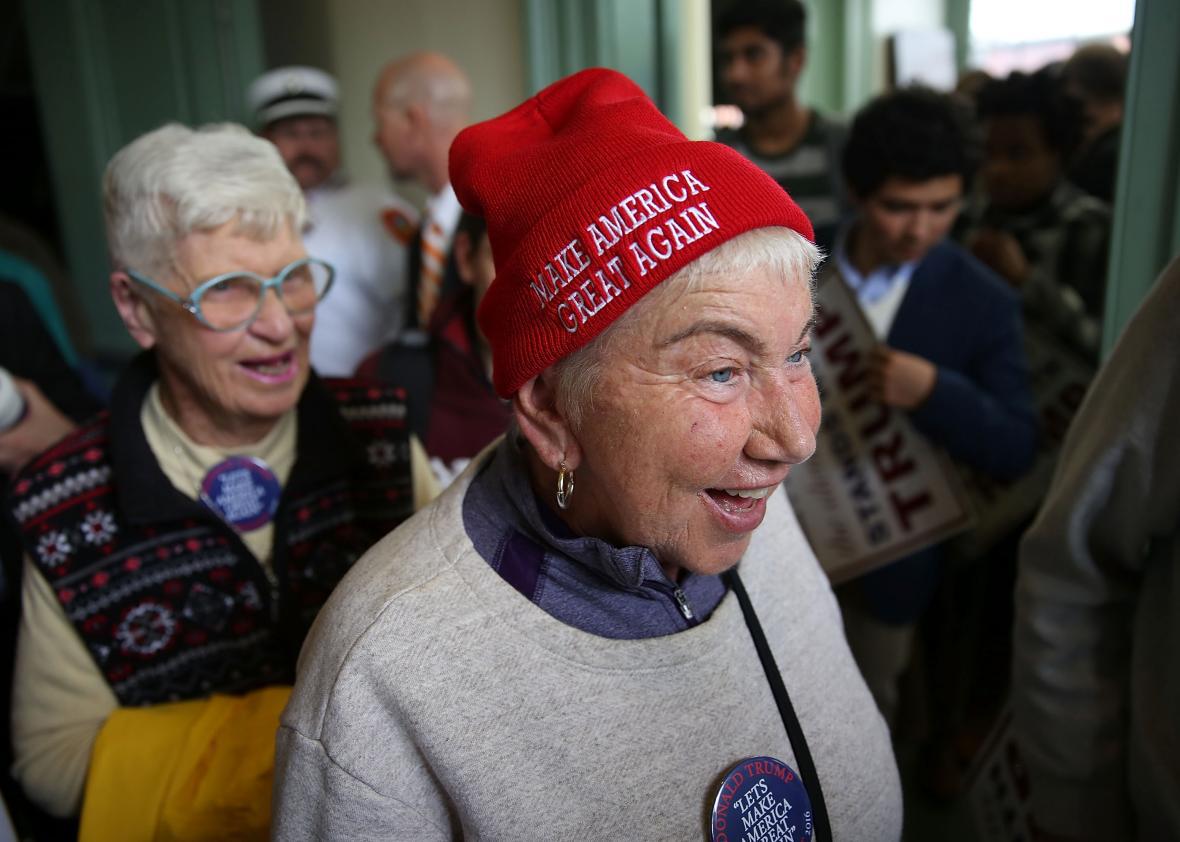Of Donald Trump’s presidential campaign, Jeb Bush put it best at Saturday’s debate in South Carolina: “This is a man who insults his way to the nomination.” By skipping the Fox News debate in January, Trump effectively stole the show without showing up. And his fans rallied behind his decision, taking to Twitter to criticize Fox host Megyn Kelly for her job performance—as well as her 2010 GQ photo spread. According to Vocativ’s analysis, a sampling of the social media fracas showed Trump enthusiasts calling Kelly a “bitch” 423 times, a “bimbo” 404 times, and a “whore” 88 times.
There are many bizarre things about Trump’s success so far; but one of the weirdest is that, despite the candidate’s long history of unapologetic lady bashing, a non-trivial number of women across the country actually want him to be the next president. In fact, as Slate’s Dahlia Lithwick wrote in August, he received even more support from female voters following the original dispute with Kelly. And this support persists. At a rally in Plymouth the day before last week’s New Hampshire primary—which Trump won handily—women commended the businessman’s outspokenness. “He’s not afraid to say what’s on his mind,” Diane Osagie, a middle-aged woman who’d traveled from Johnston, Rhode Island told me. “That’s what I like.” Even if it’s offensive, she confirmed. In response to a follow-up about the “Megyn Kelly incident,” she scoffed. “People need to grow a thick skin, honestly!”
The vibe was practically conspiratorial in the small-town Plymouth State University gymnasium that Sunday, where proponents and intrigued onlookers gathered in anticipation of the celeb’s arrival. When Trump’s supporters defended him from accusations of misogyny, it was often his candor that they praised before indicting the antagonistic media. Donna, a New Hampshire resident who declined to give her last name, was quick to stand by Trump. “It’s taking and twisting what he said and you know that,” she declared when asked about the many headlines calling the candidate a sexist. “And the reality is that you’re not here to support Donald Trump. Isn’t that true?”
Unburdened by so-called political correctness and championed as a “real man,” Donald Trump grows more popular with each boorish statement about Kelly’s menstrual cycle or Carly Fiorina’s face, which itself departed the campaign in the wake of Trump’s New Hampshire victory. See, for example, the women behind “Stump for Trump.” Since their videos went viral last fall, North Carolina sisters Lynette “Diamond” Hardaway and Rochelle “Silk” Richardson have stumped for Trump on CNN and at official campaign events. In their eyes, Trump’s unsparing reaction to his haters demonstrates his leadership skills; it’s this “take no prisoners” attitude that will undoubtedly make America great again. Like many of his supporters, Diamond and Silk interpret Trump’s candid outspokenness (and, of course, money) as success–a certain kind of success they want intensely. “Anytime you can take a million dollars and turn it into ten billion dollars,” yells Diamond in a November video titled “DONALD TRUMP PLEASE BUILD THE WALL,” “We see prosperity.”
Back in New Hampshire, the perception of Trump standing outside the typical tangle of politicians and lobbyists served him particularly well: He won 100,406 votes compared to runner-up John Kasich’s 44,909. “We need someone who knows how to get things done,” argued Steven Stefanik, co-chairman of Trump’s New Hampshire campaign, to the buzzing crowd at the Plymouth rally, “not someone who is simply going to manage our decline.” Applause filled the room, and those that weren’t clapping waved signs that read, “The silent majority stands with Trump.”
Instead of asking how a woman could vote for such a man, maybe we should ask how we ended up here. The women I spoke with in New Hampshire seemed to be looking for access to the system that has taken advantage of their silence, their obedience. When lobbyists and private interest groups succeed in influencing the government, women like Diane and Donna feel like the status quo isn’t working for them. But a candidate who operates outside the political system, who loudly flouts its conventions and decorum? Maybe he could be a way out of their silence. While the left considers Bernie Sanders an alternative to “the establishment,” the right wonders whether a blustery businessman could best represent the “silent majority’s” interests. And for some women on the right, it’s the potential impact of Trump’s voice that matters, not whether he’s used it to call other women “fat pigs.”
